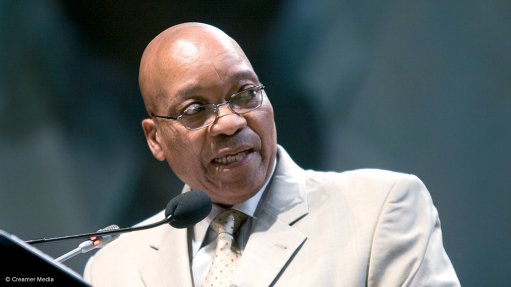
South African President Jacob Zuma
Photo by: Duane Daws
South African President Jacob Zuma said the country’s economy was facing major challenges despite 3.3% growth in the global economy.
He was speaking at the Heads of Missions conference in Pretoria on Tuesday where he addressed South African diplomatic missions that represented the country abroad.
“You are our foremost marketers and promoting tools of the country. Keep our country brand alive and visible everywhere you are,” he told delegates.
Zuma stated that South Africa had a stable economy, which was backed by the recent local government elections held in August.
He added that African countries “looked up to South Africa” because it was the biggest economy on the continent.
Zuma told delegates that government had plans to reignite growth.
“You need to familiarise yourselves with the Nine-Point Plan so that you will be able to promote our country successfully,” he added.
Zuma announced in his 2015 State of the Nation Address a nine-point plan to boost economic growth and create much-needed jobs.
Meanwhile, he mentioned that South Africa had made remarkable progress since the days of the New Partnership for Africa's Development (Nepad).
“We had begun to think together as African countries. When Nepad was developed, African leaders said they needed to be a region that could be on its own,” he said.
SOEs
Plans were under way to make sure that the country’s State-owned enterprises (SOEs) were economic growth catalysts.
Zuma stated that he would chair the next Cabinet meeting to discuss how SOEs could be key economic drivers of the economy.
“You have a responsibility to brief your host countries about our broad-based black economic transformation. They need to understand our economy when they seek business opportunities in our country,” he encouraged.
Education
Speaking on the recent university strikes nationwide, Zuma said education remained a key priority and government was making progress.
He highlighted that according to the Freedom Charter “the doors of learning shall be opened to all”.
“Government has gone beyond the call of the Freedom Charter because more children from the poor and the working class are [receiving] tertiary education. Government is [providing] the fees as announced by the Higher Education Minister [Blade Nzimande],” Zuma said.
Nzimande announced last month that universities in the country could increase fees for 2017 but not beyond 8%, adding that government would assist households with an income of up to R600 000 per annum with subsidy funding to cover the gap between the 2015 fee and adjusted 2017 fee at their institution.
Zuma informed delegates that the Commission of Inquiry into Higher Education and Training that he had established in January was tasked to deal with the issues, while looking at long-term funding and support for higher education.
He urged delegates to intervene by establishing scholarships and exchange programmes, just as Cuba has done, to help with the current education crisis.
“Countries that invested in education have moved from being called developing countries to developed countries,” Zuma stated.
He said it was worrying that the genuine concerns for education were “hijacked for the wrong reasons” in reference to the widespread violence currently being experienced at universities across the country.
He assured delegates that South Africa was “a moving country”, “despite some South Africans who thought the country was falling down”.